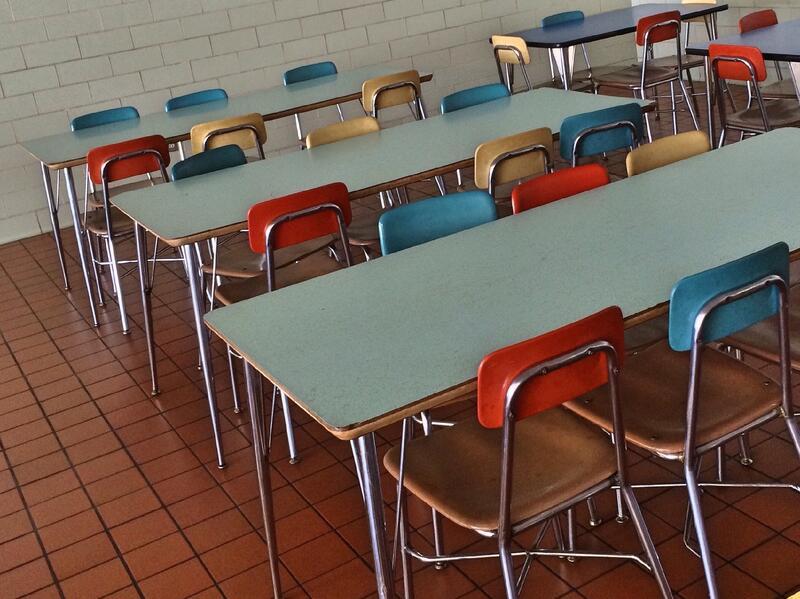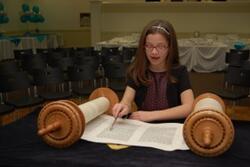A Seat at the Table: Advocating in My Modern Orthodox School
After welcoming in Shabbat for my school’s “Freshman-Senior Shabbaton” with Friday evening prayers, I walked to the meal holding my friend’s hand as she led me, squeezing through the flow of hungry high schoolers.
“Sorry, ‘scuse me. Sorry.”
I wasn’t really sorry; I wanted to get a good seat, and luckily, I found one with my fellow seniors. I sat with my friends at a small table next to a much larger table, made up of boys and a few male teachers and rabbis.
The most stressful part of any school shabbaton is finding where to sit during meals. You grab your few friends and sit them down in the middle of a long table hoping that you like the people who sit next to you. Or, you find a big group of people you like and try to squeeze in next to them. If your friend asks you to save a seat, you lay your jacket down across the bench and apologize as other people walk by thinking they found an empty seat.
On that particular shabbaton, I saw three freshman girls walk into the room, clinging to one another. After looking around, they decided to sit at the table near us mostly occupied by boys. After a few moments of sitting there, I saw one of the teachers say something to them, and they awkwardly stood up and left the table. Confused, I asked my friend across from me, “Did he just kick the only girls off of that table?”
My friend nodded, looking as bothered as I was. In a tone that I tried to control (but ended up coming out as aggressive anyway), I called the teacher's name and asked him, “Why did you kick them out?”
He responded, “Tznius reasons.”
I was shocked. Tznius is a word meant to describe modesty between boys and girls in Orthodox Judaism, but it’s usually used to describe what a girl is wearing (if it is modest or not). From my perspective, the teacher was just using the word “tznius” as an excuse so that I wouldn’t be able to respond. If it was for “tznius” reasons, anything I said wouldn’t matter.
I’ve seen these “bro tables” before. They consist of guys pushing each other around and banging the table. To have girls in the middle of all of that would bar any touching or rowdiness.
I think separate gendered bonding can be an amazing thing. But there is a time and place. In the wrong context, it comes off as exclusive or discriminatory. (And it doesn’t just exclude women; it also excludes people who are trying to figure out how or if they identify with gender.)
For the rest of the shabbaton, I wanted to walk up to the teacher and let him know how bothered I was by what had happened. He is generally a great teacher and person to talk to, but some of his actions, similar to removing the girls from the table, have made me uncomfortable in the past.
The shabbaton ended, and I didn’t talk to him. Another week went by and I didn’t talk to him. Another month went by and I didn’t talk to him. And every time I saw him, all I wanted to do was talk to him. I had practiced many times what I wanted to say.
A few months passed, and I found myself sitting in my room on a Sunday night listening to a Rising Voices Fellow (RVF) alumna talk about moral courage. The RVF Program Manager asked the other fellows and me to define moral courage, and to give an example. I defined it using the wise words of Albus Dumbledore: “We must choose between what is easy, and what is right.” My friends spoke up, giving examples of their moral courage. I couldn’t do the same. I wanted to share the story about the time three freshmen girls were kicked out of the guys’ table by a teacher at a shabbaton, and I talked to the teacher about it. But I never talked to him, and I didn’t really know why. I had just let the moment pass. I was disappointed in myself. Why had it taken me so long to walk up to him?
I finally set up a meeting with him.
We met during lunchtime on a Thursday, and I ran to his office through the rain, nervous. The incident had occurred so long ago, and I didn’t want to seem petty by bringing it up again, but I knew it was important that I speak up. After some small talk about how our days were going, I brought up what happened.
“So, do you remember during the Freshman-Senior Shabbaton, on Friday night, when we all sat down to eat and the three girls tried to sit at your table?” He immediately knew what I was talking about, and to my great relief, he thanked me for bringing it up.
“You know, I’ve wanted to talk to you about that since it happened. I’m glad you finally brought it up,” he said.
I explained that while separate gender bonding can be a great thing, there is a time and a place. He completely agreed, and understood where I was coming from.
We talked for the rest of lunch about the “bro” culture at our school, and my experience as a Jewish feminist. We talked about the differences between Ashkenazi and Sephardi culture. We talked about women carrying the Torah. We talked about gender roles. He told me that in the future, he would be more aware of creating an inclusive environment in our school.
The openness of our conversation was refreshing. I saw that teacher later in the day and he gave me a smile and a nod. I knew he took to heart our conversation. I made a promise to myself then to not shy away from speaking up about injustice. Sometimes an honest conversation is all you need to right a wrong.
After graduating, I can only hope that I made my mark on my school and left it a better place. A place where everyone has a seat at the table.
This piece was written as part of JWA’s Rising Voices Fellowship.






